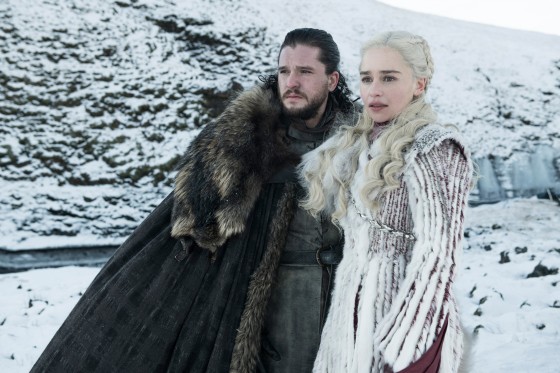For weeks, fans of “Game of Thrones” have wondered whether the final season was going to get a trailer. Whether they wanted one or not, the showrunners were overruled and the two-minute spot landed on YouTube on March 5. But season eight’s trailer isn’t like most TV teasers. Instead, it is a shockingly disciplined clip, focusing on two moments in the final season and excluding almost everything else.
The arrival of “Game of Thrones” in 2011 did not invent the concept of spoiler culture. But the global entertainment phenomenon brought the concept to mainstream attention — and indeed did so in a way that cast the idea of “spoilers” in a negative light. The twists in George R.R. Martin’s “A Song of Ice and Fire” novels rely on unreliable first-person narrators as well as the audience’s own expectations. Achieving the same twists can be difficult in TV, where stories are generally told in the third person — and that’s not even taking into account the obvious fact that plenty of the show’s biggest spoilers can be found on bookshelves.
From paparazzi photos during filming, to leaked scripts, to leaked episodes, the show has struggled over the years to protect its surprises. But this year it seems like HBO has locked the production down (perhaps thanks to expensive security measures.) Obviously, showrunners David Benioff and Dan Weiss are pleased to have this season stay under wraps, and would like to keep it that way.
SIGN UP FOR THE THINK WEEKLY NEWSLETTER HERE
But trailers, by their very nature, give things away. (Just look at the “Dark Phoenix” trailer.) They trade information for hype. And, as one can imagine, HBO would also like to make sure as many people as possible know “Game of Thrones” returns in April.
So far, the show has only pursued two main talking points in the press: The opening "arrival at Winterfell" scene, which parallels the opening scene from season one, and episode three's “Battle of Winterfell” — which is being billed as the most ambitious combat sequence ever filmed. A narrow focus has been attempted during previous press tours, but the prevalence of spoilers has made staying on message difficult.
The trailer sticks to its talking points like a politician on a Sunday morning talk show.
The trailer, though, sticks to its talking points like a politician on a Sunday morning talk show. One would think the two sequences mentioned represent the only moments of importance in the upcoming series, even though neither seem to include scenes from the season's three other episodes, each longer than the last. Nor does the trailer reveal much about the final episode, which is rumored to be as hefty as a feature-film length.
But in terms of misdirection, this trailer’s tight-lipped strategy brilliantly uses the internet and fans’ obsessive behavior against them. It’s less a trailer and more a shared collectible, to be examined as an artifact by passionate zealots. After all, the internet loves a good conspiracy theory, whether diving into the origins of the deep state or the “Red Wedding.”
Nothing connects a community of anonymous strangers quite like a search for the truth. But in this case, showrunners are giving fans a very strategic set of breadcrumbs to follow — and keep them busy — in the weeks before the premiere.
“Game of Thrones” audience members are perhaps particularly prone to conspiracy theories because the story’s major twists are often hidden in plain sight. For instance (spoiler alert!), when Ned Stark is killed off in the very first season, it’s actually a perfectly reasonable outcome given the behavior of all the parties involved. The reason it felt like a shock is because the show had spent many episodes telling us that Ned was an honorable man who didn’t deserve to die. (Also, who kills off the character whose face is featured in all the ads?)
The lesson from season one was: don’t fall for the character sleights of hand. But we have fallen for them — over and over again. And each time fans are blindsided by another death they didn’t see coming, they dig deeper into the idea that it’s all just a plot, unknowable unless you go down the rabbit hole. Why believe Occam’s Razor, when you can believe something utterly crazy — like Varys is a merman? It’s QAnon for the fantasy set.
Knowing that fans would sit down and (over)analyze every shot in every sequence, “Game of Thrones” presented a trailer consisting only of the preferred talking points. It’s an ingenious move that breaks new ground in the ever-popular war against spoilers.
Whether this is actually a war worth fighting is another question, however. Spoilers, after all, aren’t necessarily bad. It’s just that some reveals work better in context than others. Fans will find out in April if the surprises in the final season of “Game of Thrones” were worth the effort spent keeping them away.

